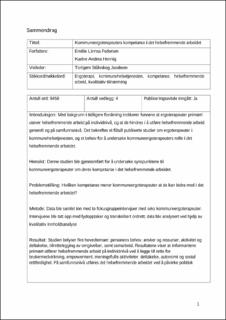| dc.contributor.advisor | Jacobsen, Torbjørn Skåleskog | |
| dc.contributor.author | Hennig, Karine Andrea | |
| dc.contributor.author | Pedersen, Emilie Linnea | |
| dc.date.accessioned | 2021-09-24T19:50:53Z | |
| dc.date.available | 2021-09-24T19:50:53Z | |
| dc.date.issued | 2021 | |
| dc.identifier | no.ntnu:inspera:77256814:80904082 | |
| dc.identifier.uri | https://hdl.handle.net/11250/2782342 | |
| dc.description.abstract | Tittel: Kommuneergoterapeuters kompetanse i det helsefremmende arbeidet
Forfattere: Emilie Linnea Pedersen, Karine Andrea Hennig
Veileder: Torbjørn Ståleskog Jacobsen
Nøkkelord: Ergoterapi, kommunehelsetjenesten, kompetanse, helsefremmende arbeid, kvalitativ tilnærming
Antall ord: 9458
Antall sider: 58
Introduksjon: Med bakgrunn i tidligere forskning indikerer funnene at ergoterapeuter primært utøver helsefremmende arbeid på individnivå, og at de hindres i å utføre helsefremmende arbeid generelt og på samfunnsnivå. Det bekreftes et fåtall publiserte studier om ergoterapeuter i kommunehelsetjenesten, og et behov for å undersøke kommuneergoterapeuters rolle i det helsefremmende arbeidet.
Hensikt: Denne studien ble gjennomført for å undersøke synspunktene til kommuneergoterapeuter om deres kompetanse i det helsefremmende arbeidet
Problemstilling: Hvilken kompetanse mener kommuneergoterapeuter at de kan bidra med i det helsefremmende arbeidet?
Metode: Data ble samlet inn i to fokusgruppeintervjuer med seks kommuneergoterapeuter. Intervjuene ble tatt opp med lydopptaker og transkribert ordrett; data ble analysert ved hjelp av kvalitativ innholdsanalyse
Resultat: Studien belyser fire hovedtemaer: personens behov, ønsker og ressurser, aktivitet og deltakelse, tilrettelegging av omgivelser, samt samarbeid. Resultatene viser at informantene primært utfører helsefremmende arbeid på individnivå ved å legge til rette for brukermedvirkning, empowerment, meningsfulle aktiviteter, deltakelse, autonomi og sosial rettferdighet. På samfunnsnivå utføres det helsefremmende arbeidet ved å påvirke politisk handling, og tilrettelegge offentlige omgivelser med hensyn til universell utforming. Samtidig bekrefter informantene at de kunne bidratt i større grad på flere av områdene.
Konklusjon: Studien konkluderer med at kommuneergoterapeuter kan bidra i det helsefremmende arbeidet både på individ - og samfunnsnivå, men at de primært benytter seg av en individbasert tilnærming. Kjernekompetansen deres viser likevel en sterk tilknytning til det helsefremmende arbeidet. Samtidig er det nødvendig at kommuneergoterapeuter inkluderes i større grad og at de kan tilbys flere arbeidsstillinger, som videre kan medføre at de får en tydeligere rolle i det helsefremmende arbeidet. Det anbefales ytterligere forskning på temaet, da studien bestod av et fåtall av informanter samtidig som at det er et viktig tema å belyse. | |
| dc.description.abstract | Title: Municipal occupational therapists´ competence in health promotion
Authors: Emilie Linnea Pedersen, Karine Andrea Hennig
Supervisor: Torbjørn Ståleskog Jacobsen
Keywords: Occupational therapy, municipal, healthcare service, competence, health promotion, qualitative approach
Number of words: 9458
Pages: 58
Introduction: Based on previous research, findings indicate that occupational therapists primarily perform health promotion based on individuals, and that barriers prevent them from performing health promoting in general, and at community level. Further research is needed to examine the role of municipal occupational therapists in health promotion, and only a handful of studies examining occupational therapy in municipal health care services has been published.
Objective: This study was undertaken to explore the views of municipal occupational therapists concerning their competences in health promotion.
Research questions: What competence do the municipal occupational therapists believe that they can contribute with in health promotion?
Method: Data were collected in two focus group interviews with six municipal occupational therapists. These interviews were tape recorded and transcribed verbatim; data were analysed using qualitative content analysis.
Results: The main findings in this study are divided into four themes: (1) the person's need, ressources and desire, (2) activity and participation, (3) adaptive environment, and (4) cooperation. The results indicate that the informants work primarily with individuals by facilitating user involvement, empowerment, meaningful occupations, participation, autonomy, social justice. At community level, health promoting is performed by influencing political action, and facilitating public environments with regard to universal design. At the same time, the informants confirm that they could have contributed more in several areas.
Conclusion: The study concludes that municipal occupational therapists can contribute to health promotion at both individual and community level, but that they primarily are using an individualized approach. Nevertheless, their key-competencies show a strong connection to health promotion. At the same time, it is necessary that municipal occupational therapists are included to a greater extent and that they can be offered more work positions, which may further lead to a clearer role in health promotion. Further research on this topic is recommended, as the study consisted of a small number of informants, while at the same time making it an important topic to shed light on | |
| dc.language | nob | |
| dc.publisher | NTNU | |
| dc.title | Kommuneergoterapeuters kompetanse i det helsefremmende arbeidet | |
| dc.type | Bachelor thesis | |
